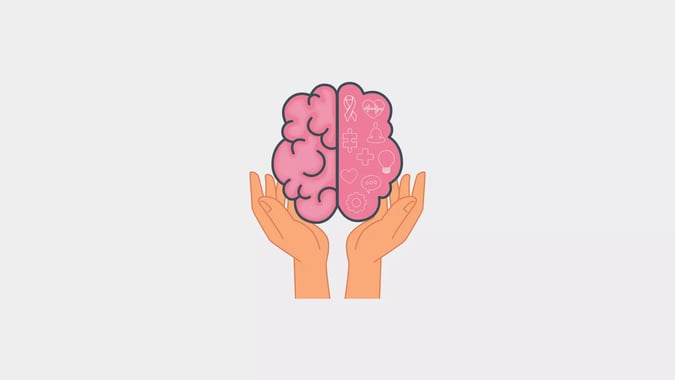
Understanding your mental health and looking after others
By: Ben Maurer

Mental health in the workplace is being spoken about more than ever before. The State of Workplace Mental Health in Australia report surveyed 1,041 employees and found that although 91 percent of employees believe mental health in the workplace is important, only 52 percent of employees believe their workplace is mentally healthy.
Data from AIHW (Australian Institute of Health & Welfare) suggests that 1 in 5 Australians (21.4% of the population aged between 16 – 85 or 4.2 million people) have experienced a mental disorder in the last 12 months.
For World Mental Health Day, Ben Maurer provides tips for those around us who may be struggling and ways to look out for someone who might be.
Meet Ben
Ben Maurer is a certified Mental Health First Aider at Six Degrees Executive. He is the Manager of our growing B2B Sales team for NSW, recently taking out the highly contested Business Development Award at Six Degrees' 2022 annual prizegiving.
Ben has always had exposure to and an understanding of mental health. He grew up in a funeral parlor, and from an early age developed a great sense of empathy for supporting others who were going through difficult times. He chose to undertake training in early 2021 to become a Mental Health First Aider, knowing that the last few years have had a significant impact on so many people around him - both at home and at work.
RELATED: Mental health first aiders are ready to respond
Throughout the training, Ben learned how to recognise changes in behaviour that could indicate someone is struggling. He also learned how to approach a conversation with someone about their mental health and well-being. It was something he found fascinating and rewarding.
"You don't have to be a qualified psychologist to be able to help someone: as a Mental Health First Aider, you're acting as the first person on the scene - like a paramedic - who can direct them to the right professional resources or services."
Ben's story
A social extravert and an optimist, Ben has always viewed the world through a glass-half-full lens. When he started to feel differently last year, it took him a long time to recognise that he was struggling with his own mental health.
"Feelings of self-doubt and loneliness I'd never experienced before started to come up. I became more emotional and reacted more to things that previously wouldn’t have affected me so deeply. I felt an overwhelming sadness at times, and at others a sense of despair, as many people have over the last few years.
It was a strange experience. Because I'd studied mental health, I was watching it unfold from a birds-eye view, understanding to a certain extent what was happening, but still reluctant to acknowledge or verbalise it. A lot of my identity was based around being positive and happy, and I couldn't reconcile that with how I was feeling - I was worried about admitting I needed help, and how it would be perceived. We’ve come a long way but there’s still a stigma, and the concern of how you’ll be perceived is real. I was the same person but also wasn’t.”
It was at this point that Ben decided to seek help. He reached out to a family connection and spoke with a couple of his close colleagues who pointed him in the direction of professional help.
"Speaking up was critical in getting me to the point I am at today, putting everything back into perspective and enjoying life again. It was the stepping stone I needed to seek professional help. In hindsight, it should have happened earlier but can be difficult to take that first step – recognising the signs and asking for help. There’s still so much stigma attached to the topic. We are all on a spectrum of mental health, and to be able to recognise and talk about being at any stage in that journey is so important. I wasn't able to recognise the signs in myself early enough to have the easiest pathway out. I want to have conversations about how we're really feeling normalised so that if intervention is needed, it can happen at the earliest possible opportunity."
Ben's Advice:
If you're struggling:
- Firstly, just know that it can happen to anyone! If you're feeling sad, miserable, or in despair, it’s okay, and you're not alone.
- Don't be afraid to speak up and talk to someone. Find someone you trust and tell them how you're feeling. Ask for help.
- Remember that mental health problems are just like physical injuries: they can be diagnosed, treated, and things can get better. There’s help out there and resources available to support you.
- Don't wait too long. The quicker you learn about how you're feeling and how to help yourself, the easier it'll be to recover.
Looking out for others:
- Learn about the signs of ill mental health: if someone is unusually quiet, detached, stressed, or displaying different behaviours, it might be a sign that they're struggling. At work they could be making errors, distracted, restless, or having performance issues. Look beneath the surface to find out if there's something bigger to be aware of.
- Regularly check in on your mates, family, neighbours, and colleagues. Don't be afraid to ask the second question "are you really ok"?
- If someone wants to talk, try to really listen to them without speaking, judging, or intervening (it's harder than it sounds).
- If someone has opened up to you about having a hard time, don't dismiss or downplay what they're feeling. Don’t judge. Just acknowledge it, ask open questions, and encourage them to take further action like talking to their doctor.
And for businesses?
- Make it easy for people to talk about mental health. Foster relationships within and across your teams that allow for that psychological safety for individuals to say exactly how they're feeling. Get to know your teams on a deeper level and build social capital. Be authentic and learn to be comfortable showing vulnerability. If it's not already part of your MO and you're not sure how, there are plenty of resources available on the Heads Up website.
- Don't differentiate between mental and physical health. They're as important as each other and should be treated the same: if someone calls up to say they're sick, the advice should be the same: "take some time off, make space for yourself, go see someone professional if you need to, how can I help?"
- Invest in Mental Health Training. Educate your employees so they feel confident in how to respond to someone who asks for help. Share mental health resources, make them easily accessible to everyone, and communicate them regularly.
- Focus on holistic wellbeing and encourage proactive health management: offer wellness or mental health days, and ensure your teams are using their annual leave too. Encourage holidays. Everyone needs to take time out to fill their cup and recharge, no matter who you are or how busy you are at work.
How Six Degrees is supporting the mental health sector
To directly link our revenue and profits to charitable causes, Six Degrees has decided to donate a set dollar amount per placement to three charities of choice over the final quarter of the 2022 calendar year (October, November, and December). The dollar amounts will be tiered depending on the value of individual placements, with an estimated donation amount to sit around 5% of our profits over this period.
We will be calculating placements and making donations monthly to Beyond Blue, along with Food Bank and The Smith Family. These charities have been chosen due to their alignment with our focus causes.
RELATED: Giving Back and Doing What’s Right
If you have found this article triggering, you can find helpful resources on the Beyond Blue and RESPECT websites. For 24-hour free counselling in Australia, call Lifeline on 13 11 14.
Related


Developing a Career Plan
Just as any successful organisation meticulously crafts a clear and strategic business plan to...

What to expect when meeting a recruiter for an interview
Meeting with a recruitment consultant is an opportunity to demonstrate how you will present for a...


 Accessibility
Accessibility